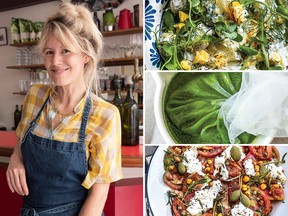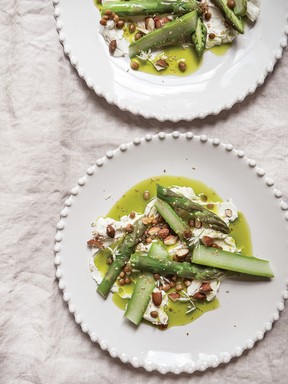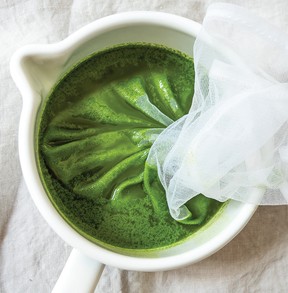
Chef Carrie Solomon’s relaxed style of French vegetarian cooking takes inspiration from Paris farmers’ markets to the coast of Brittany
Article content
Reviews and recommendations are unbiased and products are independently selected. Postmedia may earn an affiliate commission from purchases made through links on this page.
Our cookbook of the week is Bohème Cooking by Parisian chef, cookbook author and photographer Carrie Solomon.
Jump to the recipes: tomato carpaccio with crispy chickpeas, stracciatella and fried rosemary; green asparagus and lentils with labneh, almonds and green herb oil; and potato salad with tzatziki and fennel.
Advertisement 2
Article content
When American chef and cookbook author Carrie Solomon moved to Paris in 2002, vegetarian food had different connotations in French cuisine. Nose-to-tail cooking was the norm, and vegetable-focused, farm-to-table food hadn’t yet taken root. In her new book, Bohème Cooking (Countryman Press, 2024), Solomon contrasts the slim vegetarian offerings, skeptical looks and lardons “scattered on every frisée salad” she encountered then with today’s wealth of options at natural wine bars, neo-bistros and Michelin-starred restaurants alike.
Vegetarian food has undeniably gone mainstream in France. Sixty per cent of the food served at the Summer Olympic Games in Paris will be plant-based (and 80 per cent sourced locally). Solomon will be part of it as she joins a team of chefs officiating at the Official Hospitality of Paris 2024 at Roland Garros Stadium, an iconic venue hosting tennis and wheelchair tennis competitions, boxing and sitting volleyball.
Originally from Michigan, Solomon has written several French cookbooks and coauthored and photographed many others, including Chefs’ Fridges and Makers Paris. In Bohème Cooking, she shares the relaxed, French vegetarian recipes that are most often on her table.
Advertisement 3
Article content
As a chef consultant, Solomon has developed menus for Paris restaurants. Bohème Cooking was an opportunity to reconnect with her roots by writing — in English — about how she eats at home. After 22 years of living in France, Solomon had plenty of stories to share, from the cooking she did for a French family as an au pair to spending time at Alain Passard’s château in Normandy, where he grows the vegetables he serves at the three-Michelin-starred L’Arpège.
“I never would have expected to see how this type of Michelin-starred food was being made — and then I got to hang out in (Passard’s) kitchen. It was a pretty unique experience.”
A couple of years after she wrote her first cookbook, Une Américaine à Paris (2014), Solomon started writing a biweekly recipe column for Elle France. As an au pair, she had turned to the magazine for culinary inspiration, never thinking she would create the recipes one day. Each experience has led to the next, Solomon says. She was most recently the chef at Aube, a café in the 11th arrondissement, and is scoping out spots for her own restaurant (the timing is to be determined). And, a year and a half ago, she developed vegetarian recipes for French schools.
Article content
Advertisement 4
Article content
Since 2021, French regulations have mandated that school canteens serve at least one vegetarian meal per week — and there’s a willingness for more. According to a study published in Appetite in February, nearly half (49 per cent) of parents surveyed were willing to increase the frequency of vegetarian school meals from one per week to two. Roughly a quarter (26 per cent) would opt for a daily vegetarian meal.

“For all of the stereotypes about French cooking that are out there, France is making serious progress with things on a national level — going to kids’ lunch plates,” says Solomon. “I can’t say lunchbox, because kids in France don’t have lunchboxes. In almost all schools, and even private ones, for lunch, everyone eats more or less the same thing, or there are very few select choices that can be made. And it’s normally a hot lunch. It’s served in three to four courses.”
It’s an exceptional move, she adds. “The youth — and this is grade school up — will already have that in their mind that it’s normal to eat vegetarian at least a couple days a week, which I think, as a country as a whole, it’s a pretty big step.”
Advertisement 5
Article content
In Bohème Cooking, Solomon sought to dispel misconceptions about the heaviness of French cooking: “It’s not all butter and cream sauce.” Besides more vegetable representation, the cuisine’s flavour palate has expanded in the past two decades, which she also reflects in the book. Solomon notes that just as she did, chefs from around the world have made France their home and, in doing so, have changed the flavours of French cooking. Condiments such as harissa, hailing from Tunisia, and Levantine labneh sit alongside herbes de Provence, tomato confit and cornichons in the Pantry and Condiments chapter.
While Solomon included some classic French dishes in Bohème Cooking’s roughly 110 recipes, most give common French products a vegetarian twist. Though there has always been a place for vegetable cooking in France, Solomon underscores, it was often considered a side dish or an entrée. “You can’t go to any restaurant nowadays without having almost the same amount of options or sometimes even more.”
A relaxed approach underpins Bohème Cooking — a way of eating that Solomon honed once she moved into the apartment she shares with her two daughters, now 11 and 13, after a divorce. When she and her ex-husband hosted dinner parties, Solomon would spend days planning, preparing and cooking the courses, which they would eat around a large dining table. “I would go over the top. I didn’t have limits, and it was a lot of fun, but it was very fussy cooking. It was almost like my cooking school for myself, I suppose, those years,” says Solomon, laughing. “Because it was me. Nobody else was pushing me to do these dinners.”
Advertisement 6
Article content
The apartment she and her daughters moved into doesn’t have a dining room or dining table. The narrow galley kitchen has a counter that doubles as a bar, and they filled their living room with couches and chairs, coffee tables, a thick rug and pillows.
To Solomon, “bohème” doesn’t mean a multi-course meal or even a sit-down one. Often, when she has friends over, everyone ends up gathering in the kitchen or sitting around her “constellation of coffee tables,” serving themselves from big sharing plates. “It’s just a way that allows me to be present and enjoy the moment myself — and it’s not fussy.”
A lot of what Solomon categorizes as “bohème cooking” comes down to how she entertains: organically, not over-thought with vegetables at the heart. Solomon has been mainly vegetarian for 20 years and sees serving vegetable-forward meals as an “egalitarian approach.” She can invite friends over for dinner, and it doesn’t cost a fortune. “There’s a balance in vegetarian cooking. And when it’s done in a relaxed, unfussy way, that means not only do your dinner guests enjoy the moment, but you do, too. And then, in the midst of this, there are often kids running around. I’ll put that right up with that’s the ‘bohème’ lifestyle,” she laughs.
Advertisement 7
Article content
Recommended from Editorial
-

Cook This: 3 picnic recipes from The Jewish Holiday Table, including spinach rissoles
-

Cook This: 3 southern French recipes best enjoyed by the seaside, including mussels in aïoli
TOMATO CARPACCIO WITH CRISPY CHICKPEAS, STRACCIATELLA AND FRIED ROSEMARY

Serves: 4
Preparation time: 15 minutes
Cooking time: 24 minutes
For the crispy chickpeas:
1 cup (152 g) cooked chickpeas
1 tsp lemon zest
1/2 tsp sea salt
1/2 tsp Espelette pepper
1/2 tsp minced garlic
For the sun-dried tomato vinaigrette:
1/4 cup (43 g) sun-dried tomatoes
1/3 cup (67 mL) olive oil
1/3 cup (76 mL) vinegar (red wine, cider, champagne)
1/3 cup (76 mL) caper brine
2 tbsp minced shallots
Sea salt to taste
For the fried rosemary:
2 tbsp olive oil
2 fresh rosemary sprigs
For the salad:
1 1/2 lb (680 g) tomatoes, sliced
8 oz (226 g) stracciatella or burrata
2 to 3 tbsp capers
Step 1
To make the crispy chickpeas, preheat the oven to 400F (200C) and prepare a baking sheet lined with parchment paper or lightly oiled. Toss the chickpeas with the lemon zest, salt, Espelette pepper and garlic. Spread them on your baking sheet and cook in the oven until brown and crispy, 18 to 20 minutes, stirring once about halfway through. Remove the chickpeas from the oven and set aside to cool.
Advertisement 8
Article content
Step 2
To make the sun-dried tomato vinaigrette, blend together in either a mortar and pestle or a blender the sun-dried tomatoes, olive oil, vinegar, caper brine and shallots. Salt to taste, but keep in mind you may not need added salt if the caper brine is quite salty. Set the vinaigrette aside.
Step 3
To make the fried rosemary, heat the olive oil in a small non-stick pan over medium-low heat and prepare a paper towel-lined plate. Fry the rosemary leaves until they become crispy but not brown, 3 to 4 minutes. Remove the rosemary from the pan and place on the prepared plate to absorb any excess oil. Once cooled, remove from the stems.
Step 4
To assemble the salad, spread the tomatoes across a serving plate. Drizzle half the vinaigrette on top. Spoon the stracciatella over the tomatoes. Sprinkle with the crispy chickpeas, fried rosemary, and capers. The dressing and toppings for this salad can all be made up to 3 days ahead of time, just keep them in airtight containers until use. Serve the rest of the vinaigrette on the side.
Note: I often use the juice from capers, or even olives, in place of or in addition to vinegar when making vinaigrettes. This double-duty trick is especially useful when I’m on vacation and don’t want to do a lot of food shopping. The bright and briny flavour complements most fresh vegetables, and it gets the most out of what can be a slightly expensive condiment by using every last drop.
Advertisement 9
Article content
GREEN ASPARAGUS AND LENTILS WITH LABNEH, ALMONDS AND GREEN HERB OIL

Serves: 4
Preparation time: 15 minutes
Cooking time: 22 minutes
1/4 cup (20 g) slivered almonds
1/2 cup (99 g) green lentils
1 tbsp lemon juice
Sea salt to taste
1 lb (454 g) asparagus, trimmed and halved (see note)
1 cup (8 oz/227 g) marinated labneh balls or store-bought (see note)
1 tbsp sesame seeds or gomasio
Ramp Leaf Oil or Green Herb Oil (recipe follows), to serve
Fresh herbs of your choice, or ramp flowers
Step 1
Preheat the oven to 350F (180C). Place the almond slivers on a baking sheet and toast for 6 minutes.
Step 2
Prepare the lentils: Pour the lentils into a small pot and cover with 2 cups of water. Bring to a boil and then simmer for 12 to 14 minutes, until just tender but not falling apart. Drain and season with lemon juice and a pinch of salt. Set aside to cool.
Step 3
Prepare the asparagus: If the asparagus stalks are thicker than 1/2 inch (1 cm), slice them in half lengthwise. Bring a pot of salted water to a boil and prepare an ice bath. Poach the asparagus for 2 minutes. Remove the asparagus and place immediately in the ice bath in order to keep the colour from fading.
Advertisement 10
Article content
Step 4
To serve: Divide the labneh among four plates or spread it across one large platter. Place the lentils and asparagus spears on top, sprinkle with the toasted almonds and sesame seeds. Drizzle the green herb oil on top. Throw on a few fresh herbs or ramp flowers if you’ve got any and serve immediately.
Notes: If asparagus season has passed, don’t hesitate to substitute with poached green beans or roasted slices of autumn squash.
Although labneh does not have its roots in France (it is said to have originated in the Levant), it has gained a fast following among the French, who are prolific consumers of yogurt, labneh’s main and almost sole ingredient. You can easily make your own labneh, it just takes a little patience. But if you’re in a pinch, mix together equal parts cream cheese and full-fat Greek yogurt for a similar texture and flavour.
RAMP LEAF OIL (OR GREEN HERB OIL)

Makes: 1 1/2 cups (297 g)
Preparation time: 5 minutes
1 cup (30 g) ramps or wild garlic leaves, roughly chopped (you can also substitute dill, parsley, basil or spring onion)
1 1/3 cups (267 mL) olive or grapeseed oil
A pinch of sea salt
Advertisement 11
Article content
Step 1
Rinse and dry the ramp leaves completely with a towel in order to avoid adding water to your oil. Add the ramps, oil and salt to a blender or a handheld mixer and blend for 1 minute. Pour the mixture into cheesecloth and filter completely into an airtight container or glass jar. Keep refrigerated for up to 2 weeks.
Note: Once you strain the oil, you can keep the remaining cream and use it as you would a pesto, adding in a little shaved Parmesan and ground pine nuts.
POTATO SALAD WITH TZATZIKI AND FENNEL

Serves: 4 to 6
Preparation time: 15 minutes
Cooking time: 10 minutes
2 lb (907 g) small potatoes (baby red, baby russets, fingerling), cut into 1-inch (3 cm) cubes
2 cups (448 g) Seasonal Tzatziki (recipe follows)
4 hard-boiled eggs, chopped
1 cup (87 g) diced fennel
1/4 cup (61 g) fresh herbs (chives, parsley, dill, basil)
2 tbsp lemon juice
1 tsp sea salt
1 tsp freshly ground black pepper
Step 1
Bring a medium-large pot of water to a boil. Boil the potatoes until fork tender, 8 to 10 minutes. Rinse the potatoes in cold water to stop them from overcooking and then let them cool and dry completely.
Advertisement 12
Article content
Step 2
Place the potatoes in a medium salad bowl, stir in the tzatziki, hard-boiled eggs, fennel, herbs, lemon juice, salt and pepper. Smash the potatoes ever slightly with the back of a fork or a potato masher just to create some starches to help all the flavours combine. Place the potato salad in the refrigerator 30 minutes or up to 2 days before serving.
SEASONAL TZATZIKI
Makes: 2 cups (454 g)
Preparation time: 15 minutes
1/2 lb (227 g) kohlrabi or celery root, zucchini, cucumber
1 cup (227 g) Greek yogurt, full fat is best (see note)
2 tbsp dill, minced, plus more to taste
2 tbsp mint, minced, plus more to taste
1 to 2 garlic cloves, minced
2 tbsp lemon juice
1/2 tsp sea salt, plus more to taste
Extra virgin olive oil to serve
Freshly ground black pepper to taste
Step 1
Carefully peel the kohlrabi and grate it on the smallest grade of a four-sided grater. If necessary, you could also use a small hand grater or food processor. Place the grated kohlrabi in a clean towel. Roll up the towel and squeeze it tightly to drain any excess water. This step is really important, otherwise the tzatziki will be too watery.
Advertisement 13
Article content
Step 2
Mix the grated kohlrabi with the yogurt. Add the dill and mint. Add the garlic (depending on how garlicky you want it), lemon juice and salt. Mix everything together with a spoon, then place the tzatziki in the refrigerator for at least 30 minutes or up to 2 days before serving. Serve with a small drizzle of olive oil on top and additional herbs (if you like) and a little salt and pepper.
Note: You can use either cow’s milk or sheep’s milk Greek yogurt. But in both cases, this recipe requires Greek yogurt because a classic yogurt does not have enough thickness to produce a sufficiently creamy tzatziki.
Recipes and images excerpted from Bohème Cooking by Carrie Solomon (Countryman Press). Copyright ©2024 by Carrie Solomon.
Our website is the place for the latest breaking news, exclusive scoops, longreads and provocative commentary. Please bookmark nationalpost.com and sign up for our cookbook and recipe newsletter, Cook This, here.
Article content

